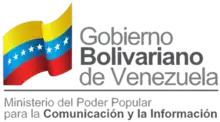| Ministerio del Poder Popular para la Comunicación y la Información | |
 | |
| Agency overview | |
|---|---|
| Jurisdiction | Government of Venezuela |
| Headquarters | Caracas, Venezuela |
| Annual budget | ≈ $380 million (2015)[1] |
| Agency executive |
|
| Child agencies | |
| Website | www |
The Ministry of Popular Power for Communication and Information (Minci) is a public ministry of the Government of Venezuela dedicated to communication, informing the Venezuelan public and promoting the Venezuelan government.[1][3][4]
Structure
- Minister of Popular Power for Communication and Information
- General Directorate Office
- General Directorate of Presidential Communications
- Vice Minister of Communication and Information
- Vice Minister of Television
- Vice Minister of Radio
- Vice Minister of Print Media
- Vice Minister of Social Networks[5]
Organs and Affiliated Entities Ministry
Affiliated media organizations
Affiliated media organizations include:[6]
Ministers
| Period | Minister |
|---|---|
| 13 October 2014 – 28 April 2015 | Jacqueline Faría |
| 3 August 2013 – 13 October 2014 | Delcy Rodríguez |
| 13 October 2012 - 3 August 2013 | Ernesto Villegas[7] |
| December 2010 - 12 October 2012 | Andrés Izarra[8] |
| July - December 2010 | Mauricio Rodríguez[8] |
| ? - July 2010 | Tania Díaz[8] |
| 2009 - 2010 | Blanca Eekhout |
| 2008 - 2009 | Jesse Chacón |
| Dec 2007[9] - July 2008 | Andrés Izarra[8] |
| Mar 2006[10] - Dec 2007[9] | Willian Lara |
| 9 March 2005 - Mar 2006[10] | Yuri Pimentel |
| September 2004 - March 2005 | Andrés Izarra[8] |
| ? - 2004 | Jesse Chacón, Nora Uribe[8] |
Censorship
The Institute Press and Society (Ipys) has criticized freedom of information and expression in Venezuela, though the Ministry of Popular Power for Communication and Information responded to these allegations by criticizing the Ipys report due to its alleged funding from United States organizations, such as the National Endowment for Democracy.[11]
See also
References
- 1 2 "Gobierno gastará más en propaganda que en el municipio Libertador". El Nacional. 23 October 2014. Archived from the original on 24 October 2014. Retrieved 24 October 2014.
- ↑ "¿Quién es Desireé Santos Amaral?". Archived from the original on 2018-09-29. Retrieved 2017-07-16.
- ↑ Díaz, Sugey (15 October 2014). "El Minci "sigue siendo un ministerio de propaganda del PSUV"". La Verdad. Retrieved 24 October 2014.
- ↑ Vásquez S., Álex (28 October 2014). "65% del dinero del Minci se utilizará en propaganda oficial". El Nacional. Archived from the original on 12 July 2014. Retrieved 13 July 2014.
- ↑ "EL MINISTERIO". Ministry of Popular Power for Communication and Information. Retrieved 24 October 2014.
- ↑ "Ministerio del Poder Popular para la Comunicación y la Información". Ministerio del Poder Popular para la Comunicación y la Información. Retrieved 22 February 2015.
- ↑ (in Spanish)"Conozca el perfil de los seis nuevos ministros designados por el presidente Chávez", Globovision, 13 October 2012 "Conozca el perfil de los seis nuevos ministros designados por el presidente Chávez - Globovision". Archived from the original on 16 January 2013. Retrieved 2013-01-14.
- 1 2 3 4 5 6 (in Spanish), El Universal, 7 December 2010, Designado Andrés Izarra como ministro de Información
- 1 2 "Andrés Izarra designado nuevamente ministro de Comunicación e Información (MinCI)". 3 January 2008. Retrieved Jun 16, 2012.
- 1 2 Sosa, Matilide. "La comunicación o la Revolución dentro de la Revolución". Archived from the original on 2007-06-12. Retrieved Jun 15, 2012.
- ↑ "Minci desmiente un informe de Ipys sobre medios cerrados en Venezuela". La Nación. 10 October 2014. Retrieved 24 October 2014.
This article is issued from Wikipedia. The text is licensed under Creative Commons - Attribution - Sharealike. Additional terms may apply for the media files.